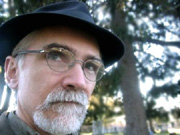Rick Mullin
is a painter and journalist who recently returned to writing poetry seriously after an extended period of concentrating on painting. He has poems appearing in summer or fall editions of The New Formalist, Contemporary Sonnet, Relief, and The Shit Creek Review.
Rick lives in northern New Jersey.
—Back to Milestones Contents/Issue Links—
|
Voices When Harsh Music Dies
There are voices when harsh music dies
And softer beds of floral sheets to wrap
The harshest dreams that salt a lover’s eyes
In silent rooms where peaceful strangers nap.
And there are lofty, speculative minds
That putter in their padded cells of bone
Between the dark and dawning, quite resigned
To rest when softly they can sing alone.
Into the night the voices of these brains
Recite the primal verse, the ancient light
That sheds a darkness over sleep and strains
To harmonize the melodies of night.
Yet silence haunts the studios of shade
Where dreams in quiet, measured breaths parade.

Artist’s Statement
I
probably wrote Voices When Harsh Music Dies in college, but I’ll tell you that I wrote it in the Chelsea Hotel. I lived there for several months after graduating, and I’m sure that I rewrote it or at least retyped it in that hotel room. It heightens the Chatterton effect to say this poem was written at the Chelsea.
Either way, I wrote this in my very low twenty-somethings, at that time in life when one is graced with an irretrievable naivety.
Voices When Harsh Music Dies was the inspired by a poem by Percy Bysshe Shelley called Music When Soft Voices Die:
Music, when soft voices die,
Vibrates in the memory—
Odours, when sweet violets sicken,
Live within the sense they quicken.
Rose leaves, when the rose is dead,
Are heaped for the beloved’s bed;
And so thy thoughts, when thou art gone,
Love itself shall slumber on.
I turned the sense of the title line around during the heyday of punk rock in the late 1970s. My rooms—dorm and hotel—were my refuge, the buffer between me and contemporary life in which I dug into the things I really loved, things that were shaping up as ideals, my personal hooks to eternal values. In these rooms I pined romantically and plumbed my soul. I expressed my feelings for the first time.
Those rooms remains with me. The place I go, often very late at night, to be alive and alone and contemplate experience, both immediate and over time. And the poem has remained with me like no other.
I wrote a lot of poetry in college—I even edited the school’s literary magazine my senior year. And I wrote for a while afterward. Then I stopped. Perhaps I was losing my grip on naivety. Maybe it’s that journalism paid and took my writing somewhere else. Maybe I needed to live a little, accumulate some experience and give it the perspective of time before I could advance in poetry. Maybe it was that trip to Utrecht Art Supplies on 4th Avenue one day in the 1980s.
In 2006, on the 59th anniversary of Ginsberg’s first recital of Howl, I wrote my first poem in over a quarter century. I don’t know whether I went to the notebook in which keep a copy of Voices When Harsh Music Dies before or after I wrote the poem, but I certainly went to it and read it again. I was writing a poem, and I was lucky enough to have a personal Rosetta Stone. A personal standard, such as it is, for creativity in verse.
I have returned with a real force to writing poetry after years of concentrating on painting, and recently finished a sonnet cycle about the Chelsea Hotel. When I got close to finishing the cycle, I realized there was a need for a kind of contemplative coda going into the final sonnet. I just happened to have a drop-in solution
.
|


